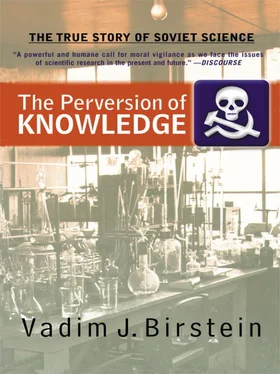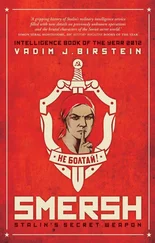161. Antonova and Drozdova, “Rossiiskie uchenye—akademiku A. V. Lunacharskomu,” p. 265.
162. See details about the commission in Perchenok, “Akademiya Nauk,” p. 174.
163. The transcript of the General Meeting of the Academy of Sciences, Academy of Sciences Archive, F. 3, Op. 4, D. 7, L. 98. Cited in Perchenok, “Akademiya Nauk,” p. 230.
164. Stetsovsky, Istoriya , vol. 2, p. 170.
165. For instance, Soyfer, Lysenko , and Krementsov, Stalinist Science .
166. Soyfer, Lysenko , pp. 132–135.
167. See details, for example, in Joravsky, The Lysenko Affair, pp. 229–243.
168. Soyfer, Lysenko , pp. 8–42.
169. Graham, What Have We Learned , pp. 17–28.
170. Gaisinovich, A. E., and K. O. Rossianov, “‘Ya gluboko ubezhden chto ya prav’: N. K. Koltsov i lysenkovshchina” [“I am deeply convinced that I am right”: N. K. Koltsov and Lysenko], Priroda 6 (1989): 95–103 (in Russian).
171. Graham, What Have We Learned, p. 20.
172. Dobzhansky, Theodosius, “The Crisis in Soviet biology,” in Simmons, Ernest J., ed., Continuity and Change in Russian and Soviet Thought (Cambridge: Harvard University Press, 1955), pp. 329–344. On Dobzhansky, see, for instance, Adams, Mark B., ed., The Evolution of Theodosius Dobzhansky: Essays on His Life and Thought in Russia and America (Princeton: Princeton University Press, 1994).
173. Fyodorovich, V., “The Winter Fields,” Pravda , August 7, 1927 (in Russian).
174. Details in Soyfer, Lysenko, pp. 12–31.
175. Popovsky, The Vavilov Affair, pp. 41–51.
176. Manevich, E. D., “Takie byli vremena” [It was a special time], V oprosy Istorii Estestvoznaniya i Tekhniki 2 (1993): 119–132 (in Russian). Manevich mentioned that Dr. Joseph Needham and not Eric Ashby attended the lecture with Julian Huxley. But Huxley wrote that he possessed a copy of the summary of this lecture written by Ashby. See Huxley, Julian, Soviet Genetics and World Science: Lysenko and the Meaning of Heredity (London: Chatto and Windus, 1949), p. 101.
177. Huxley, Soviet Genetics, pp. 101–102.
178. Cited in Zonn, S. V., “Akademik Vladimir Nikolaevich Sukachev (1880–1967) kak prezident Moskovskogo Obshchestva Ispytatelei Prirody” [Academician Vladimir Nikolaevich Sukachev (1880–1967) as the president of the Moscow Society of Naturalists], Bulletin Moskovskogo Obshchestva Ispytatelei Prirody, Otdelenie biologicheskoe 101 (3) (1996): 97–102 (in Russian).
179. Lysenko, T. D., “Novoe v nauke o vide” [News in the science of species], Agrobiologiya [Agrobiology] 6 (1950): 15–25 (in Russian).
180. Lysenko, Trofim D., Agrobiologiya [Agrobiology] (Moscow: Selkhozgiz, 1952), p. 552 (in Russian).
181. Ibid., p. 604.
182. Ibid., p. 662.
183. Lysenko, “The Situation in Biological Science,” in The Situation in Biological Science: Proceedings of the Lenin Academy of Agricultural Sciences of the USSR, July 31–August 7, 1948: Complete Stenographic Report (New York: International Publishers Co., 1949), p. 132.
184. Soyfer, Lysenko, p. 210.
185. Dobzhansky, Theodosius, “Lysenkoist’s ‘Michurinist’ genetics,” Bulletin of Atomic Scientists 8 (1952): 40–44.
186. Cited in Soyfer, Lysenko, p. 58.
187. Ibid., p. 121.
188. Ibid., p. 61.
189. A short history of the creation of kolkhozes is given, for instance, in Heller and Nekrich, Utopia in Power, pp. 232–244.
190. Rossianov, K. O., “Editing Nature: Joseph Stalin and the “New” Soviet Biology,” Isis 84 (1993): 728–745.
191. Huxley, Julian, Evolution in Action (New York: Harper and Brothers, 1953), p. 169.
192. Cook, R. C., “Lysenko’s Marxist Genetics: Science or Religion?” Journal of Heredity 40 (7) (1949): 169–202.
193. Adams, Mark B., “Science, Ideology, and Structure: The Koltsov Institute, 1900–1970,” in Lubrano, Linda L., and Susan G. Solomon, eds., The Social Context of Soviet Science (Boulder: Westview Press, 1980), p. 199.
194. Cited in Blyum, Sovetskaya tsenzura , p. 112.
195. Yakovlev, B., Kontsentrastionnye lageri SSSR [Concentration Camps in the USSR] (München: Institute for the Study of the History and Culture of the USSR, 1955), p. 69 (in Russian).
196. Lifton, The Nazi Doctors , pp. 292–293.
197. See, for instance, Hilberg, Raoul, The Destruction of the European Jews (New York: Holmes and Meier, 1985), pp. 27–37.
198. Müller-Hill, “Science, Truth and Other Values,” p. 405.
199. Grekova, T. I., and K. A. Lange, “Tragicheskie stranitsy istorii Instituta Eksperimental’noi Meditsiny (20–30-e gody)” [The tragic pages of the Institute of Experimental Medicine history, the 1920s–1930s], in Yaroshevskii, M. G., ed., Repressirovannaya Nauka, Vypusk II [Repressed Science, issue 2] (St. Petersburg: Nauka, 1994), pp. 10–11 (in Russian).
200. Shatunovskaya, Lidiya, Zizn’ v Kremle [Life in the Kremlin] (New York: Chalidze Publications, 1982), pp. 197–200 (in Russian).
201. Rapoport, Yakov, The Doctor’s Plot of 1953, trans. N. A. Petrova and R. S. Bobrova (Cambridge: Harvard University Press, 1991), p. 32.
202. Conquest, The Great Terror , p. 58.
203. Radzinsky, Edvard, Stalin , trans. H. T. Willetts (New York: Anchor Books, 1996), pp. 292 and 422.
204. Petrov and Skorkin, Kto rukovodil NKVD , pp. 357–358.
205. Radzinsky, Stalin , p. 423.
206. Volkogonov, Stalin , pp. 339–340.
207. Radzinsky, Stalin, pp. 293–294.
208. Ibid., p. 421.
209. Volkogonov, Stalin, p. 340.
210. Allilueva, Svetlana, Twenty Letters to a Friend, trans. Priscilla Johnson McMillan (New York: Harper and Row, 1967), p. 196.
211. Mlechin, Leonid, Predsedateli KGB: Rassekrechennye sud’by [The KGB Chairmen: Declassified Biographies] (Moscow: Tsentrpoligraf, 1999), p. 171 (in Russian).
212. Stolyarov, Kirill, Palachi i zhertvy [Executioners and Victims] (Moscow: Olma-Press, 1997), pp. 66–67 (in Russian).
213. Hodos, George H., Show Trials: Stalinist Purges in Eastern Europe, 1948–1954 (New York: Praeger, 1987), pp. 106–107.
214. From an interview with Anna’s son Vladimir by Rosamond Richardson. Cited in Richardson, Rosamond, Stalin’s Shadow: Inside the Family of One of the World’s Greatest Tyrants (New York: St. Martin’s Press, 1994), pp. 232–233.
215. Ibid., p. 233, from an interview with Yevgeniya’s son Sasha by Rosamond Richardson.
216. There were two prisoner cards for Molochnikov in the file of Vladimir Prison, with his full name and as Prisoner No. 21 (Documents 3 and 4 in Appendix II).
217. Personal communication in 1990.
218. Vaksberg, Arkady, Stalin Against the Jews , trans. A. W. Bouis (New York: Alfred A. Knopf, 1994), pp. 156–157.
219. Kostyrchenko, Out of the Red Shadows , p. 79.
220. Vaksberg, Stalin Against the Jews, p. 217.
221. Kostyrchenko, Out of the Red Shadows , pp. 82–83.
222. The text is reproduced as Document No. 6 in Naumov, V., and Yu. Sigachev, Lavrentii Beria, 1953 (Moscow: Mezhdunarodnyi Fond “Demokratia,” 1999), pp. 23–25 (in Russian).
223. See, for instance, Kostyrchenko, Out of the Red Shadows , pp. 31–34.
224. Beria’s letter to the Presidium (Politburo), dated April 2, 1953. Reproduced in Naumov and Sigachev, Lavrentii Beria, pp. 25–28 (document no. 7).
Читать дальше











